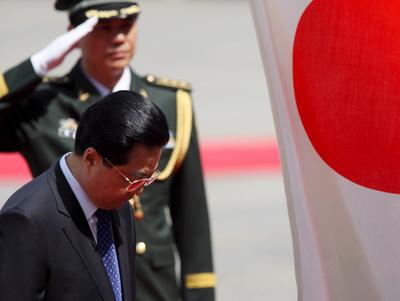Both China and South Korea contributed significantly to Japan’s disaster response in the immediate aftermath of the crisis, providing emergency relief teams and the provision of material support. The large (and unprecedented) level of support that China offered, especially the prompt dispatch of a Chinese search and rescue team, has led some to posit that warming relationships between Japan, China and Korea may be the silver-lining to Japan’s national tragedy. For China, with whom Japan’s relationship slumped precariously after a fishing infraction turned into a territorial dispute in November of 2010, the quake presented a circuit-breaker.
Certainly there has been an improvement in the relationship at the people-to-people level. China’s media commented favourably about the Japanese people’s resilience and lawfulness under the extreme duress of the power, food and water shortages and personal devastation. The Chinese media wondered aloud if China could ever reach such levels of civility. That peers in Asia were viewing the response of Japanese society response favourably was a story in turn picked up the Japanese media and became a source of national pride for the many Japanese doing it hard. The empathy and mutual respect between the Japanese and Chinese (and others around the world) was at its zenith.
In the longer term it is unlikely that the earthquake will mark a turning point in the Sino-Japanese relationship. Tensions in the Sino-Japanese relationship are founded on not only societal distrust but also on the different basic strategic interests and perceptions of the two powers.
In the aftermath of the triple disaster China’s full offer of a PLAN hospital ship and expanded rescue team were not accepted by Japan.
This was because of the fundamentally different strategic orientations of the two countries and lack of trust of the Chinese military in Japanese policy circles, not to mention the political implications of inviting Chinese military personal into Japan to work next to the US forces under Operation Tomodachi. Japanese politicians too would have had some difficulty in explaining a major Chinese presence after recent and damaging disputes — especially over the export of rare earths (a subject that Kan has flagged for discussion during the Trilateral Summit). Even the initial warming in the relationship is beginning to abate. The Chinese media is reporting negatively on the choice of Fukushima as the feature of the Trilateral Summit, while discussion in Japan is about China’s increasing influence in the regional order and Japan’s relegation to a junior partner. Opinion within Japan is divided. The influential journalist Yoichi Funabashi argues that Japan must ‘cleave to’ China in the future, while acknowledging that reorientation towards China will require political courage — a commodity in desperately short supply.
Joel Rathus is an EAF postdoctoral scholar and a regular contributor to the East Asia Forum. His other posts can be found here.


Political courage is in short supply nearly everywhere these days, but it will be good for everyone if Chinese and Japanese relationships could improve at top level. It was nice to read this piece.
Hello,
Your question interesting and on place. However, I think you should contemplate the whole idea with a counterfactual – what would happen, if China did not offer help to Japan? Also when you say ‘The large (and unprecedented) level of support that China offered…’ is very undefined and a relative statement. For example, according to the latest reports Taiwan was among the top contributors (close to 17 billion yen), surpassing China. I think international aid to countries afflicted by natural accidents is also a matter of international etiquette. A look at history will tell you, that neighbors hit by major disasters tend to help eachother.
Certainly, I agree that natural calamities of some degree, offer an opportunity to turn strained relations in a new direction, but I would be careful with premature predictions, especially when based on limited data.
Regarding grass-root level relations turning out better, I think favorable media reports about the Japanese stoicism are not enough to prove the point. Cognitive psychology will tell you that perceptions of people in distress tend to have a significantly positive contour. I think the interesting question is how will the Fukushima nuclear crisis affect (and is already affecting) the perception of Japan and its people in China and worldwide.
Bostjan Bertalanic
PhD candidate
Univeristy of Tokyo
Operation TOMODACHI and the Futenma issue are clearly linked – US public (military?) diplomacy at its best.The US would not have wanted the PLA cluttering up the optics on this.